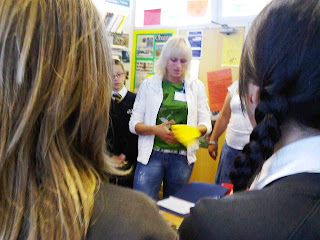Our second day in a row at Treviglas, Newquay. Inga Riaukaité comes too. Inga was one of the four workers at SEF (Southern England Farms) who made the film, The Hidden Life of a Cornish Farm, that we showed at Penair School, Truro, in March. Pick her, and Vadim, up from SEF in Leedstown at 7am. It's an early start for us all...
We have three classes during the morning. And lively discussions. Inga is from Lithuania. One boy asks whether if French is the language spoken in Lithuania. Another asks whether all the buildings are red - he has heard so.
All are very interested to hear about the work that Inga (a qualified industrial engineer) and Vadim (former medical student, ballroom dancing champion of Latvia and keen fisherman) are now doing on the land. Both have worked in the fields, cutting cauliflower, cabbage, broccoli etc. Inga now works in the packhouse as a supervisor.
We ask if anyone has a dream of being a doctor some day? Out of 75 children in the three classes this morning - one has this ambition. Vadim is surprised that there are not more.
Inga's dream is to be either a police officer or join the army.
She is a champion runner (having run for Vilnius). She runs every morning on the North Cliffs (near Godrevy). She is also a keen climber who's next aim is to go pot-holing. She loves clubbing - she has visited Newquay before! Her energy and enthusiasm, in fact, fill the classrooms ...
Today - as yesterday - few students knew about the Soviet Union and its history. Some were able to point to Lithuania and Latvia on the map.
But one girl in particular, out of the blue, said this morning she was very interested in the Soviet Union and its former republics. She understood something about the pressures Vadim (as a Russian) had faced in the country after independence.
It has been interesting to see in the workshops this year how different classes have different dynamics and levels of engagement with the subject. This engagement has nothing to do with academic achievement. It all seems to depend on the students' spirit and openness to new ideas.
This morning is full of surprises. We ask students to write lists of the things that they would pack in their suitcases, if they had to leave home to create a life in another country.
Inga and Vadim have brought bags filled with things that they actually did bring here when they arrived, in search of work.
Inga shows students a mini t-shirt that her friends gave her: they knew that she had once wanted to join the army. "Inga, the army needs you!" says the slogan. She's also brought a photo of her athletic team...
And photos of herself training and rockclimbing....
Plus her graduation certificate. To remind herself of her ambition and her dreams.





























